Mental Health Nursing Case Study: Applying Recovery to Bipolar
VerifiedAdded on 2023/06/03
|18
|4792
|55
Case Study
AI Summary
This case study analyzes the historical and current factors influencing mental health recovery, focusing on a 25-year-old Chinese immigrant named Victor suffering from Bipolar Disorder. The study reviews Victor's medical history, including instances of euphoria, sadness, hallucinations, and substance abuse. It elaborates on recovery principles applicable to Victor, including the Lay model of mental illness, and presents a critical reflection on clinical experience to improve intervention strategies. The paper emphasizes the importance of addressing social stigma and discrimination, utilizing person-centered recovery principles, and employing psychotherapy and medication to facilitate the recovery process. The study also highlights the need for a safe, positive recovery environment and the active involvement of the client in their treatment.
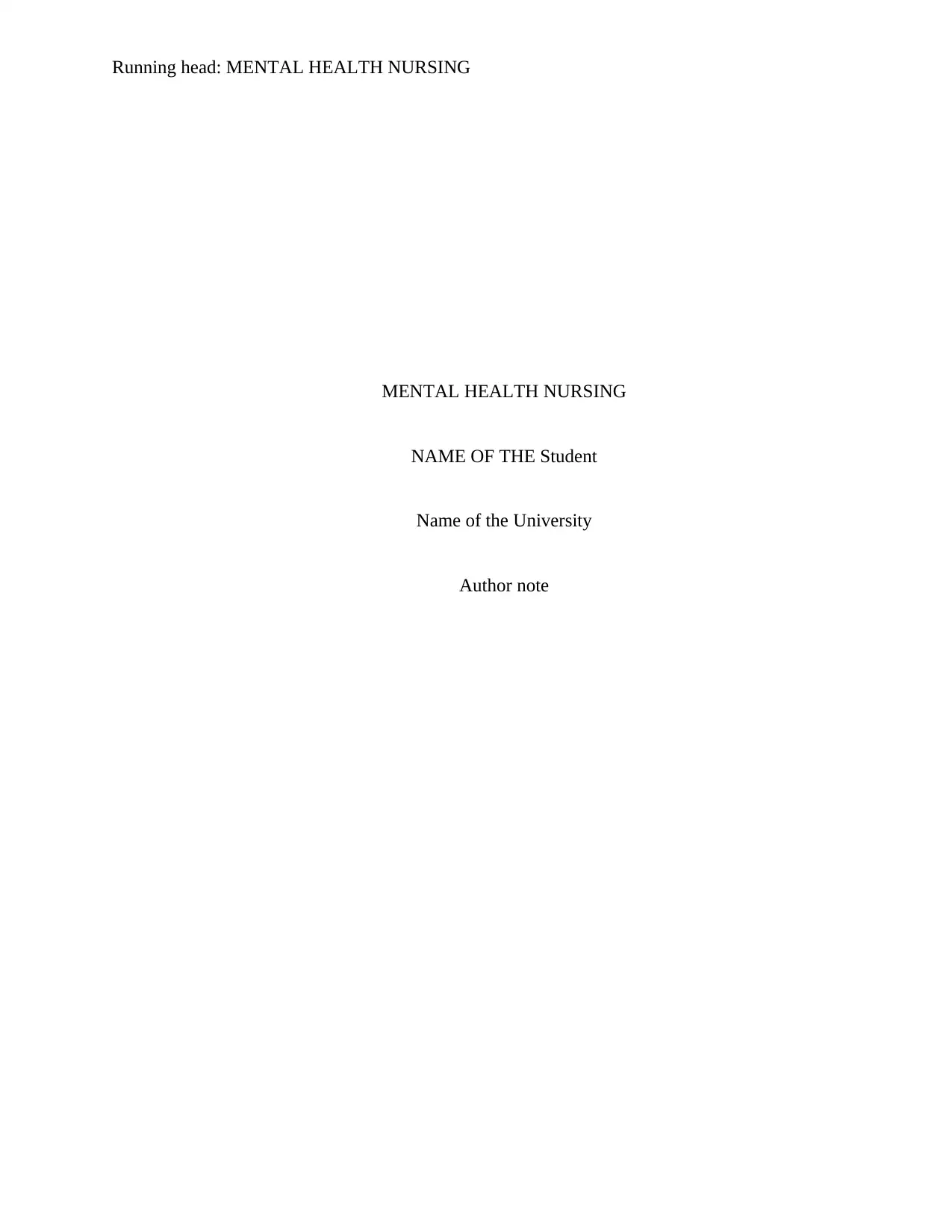
Running head: MENTAL HEALTH NURSING
MENTAL HEALTH NURSING
NAME OF THE Student
Name of the University
Author note
MENTAL HEALTH NURSING
NAME OF THE Student
Name of the University
Author note
Paraphrase This Document
Need a fresh take? Get an instant paraphrase of this document with our AI Paraphraser
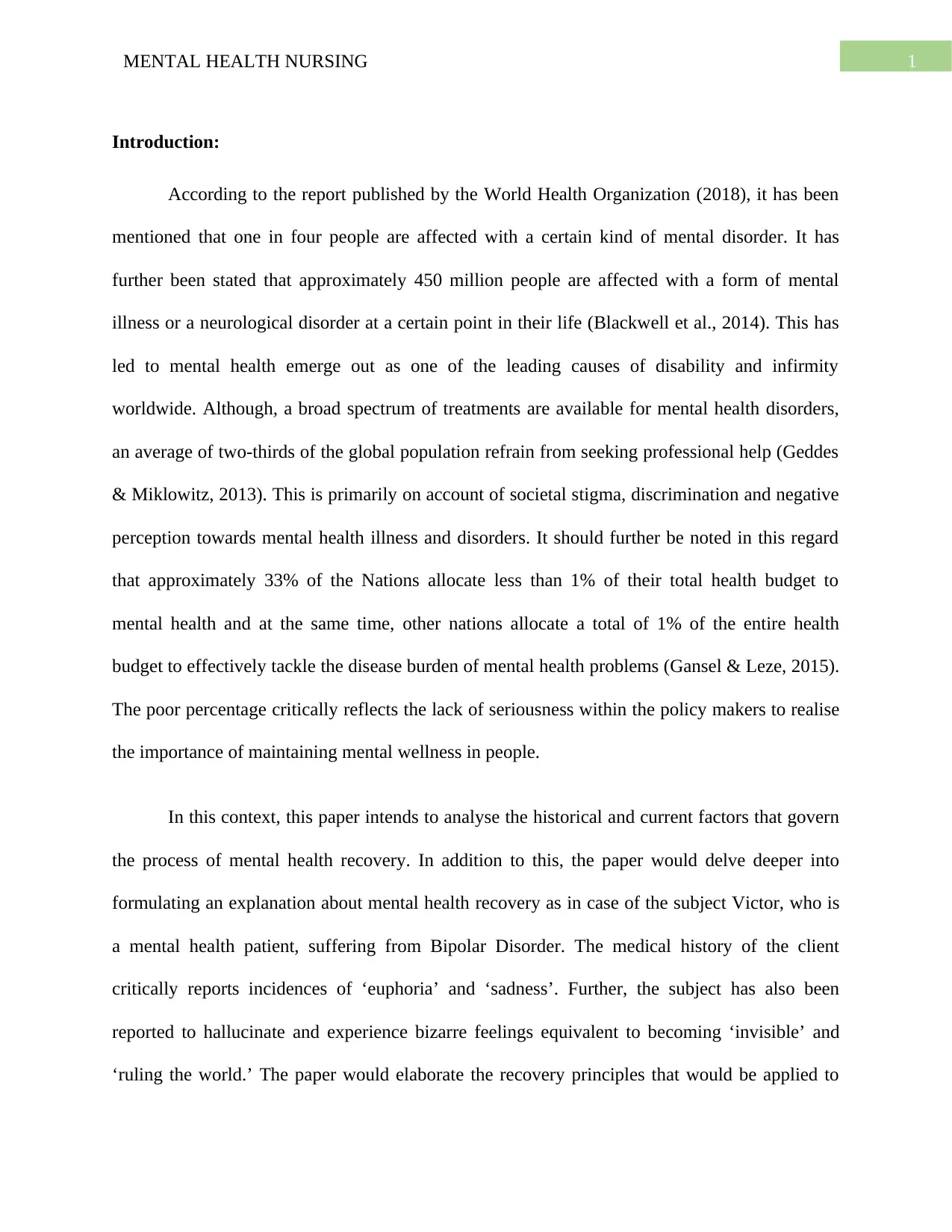
1MENTAL HEALTH NURSING
Introduction:
According to the report published by the World Health Organization (2018), it has been
mentioned that one in four people are affected with a certain kind of mental disorder. It has
further been stated that approximately 450 million people are affected with a form of mental
illness or a neurological disorder at a certain point in their life (Blackwell et al., 2014). This has
led to mental health emerge out as one of the leading causes of disability and infirmity
worldwide. Although, a broad spectrum of treatments are available for mental health disorders,
an average of two-thirds of the global population refrain from seeking professional help (Geddes
& Miklowitz, 2013). This is primarily on account of societal stigma, discrimination and negative
perception towards mental health illness and disorders. It should further be noted in this regard
that approximately 33% of the Nations allocate less than 1% of their total health budget to
mental health and at the same time, other nations allocate a total of 1% of the entire health
budget to effectively tackle the disease burden of mental health problems (Gansel & Leze, 2015).
The poor percentage critically reflects the lack of seriousness within the policy makers to realise
the importance of maintaining mental wellness in people.
In this context, this paper intends to analyse the historical and current factors that govern
the process of mental health recovery. In addition to this, the paper would delve deeper into
formulating an explanation about mental health recovery as in case of the subject Victor, who is
a mental health patient, suffering from Bipolar Disorder. The medical history of the client
critically reports incidences of ‘euphoria’ and ‘sadness’. Further, the subject has also been
reported to hallucinate and experience bizarre feelings equivalent to becoming ‘invisible’ and
‘ruling the world.’ The paper would elaborate the recovery principles that would be applied to
Introduction:
According to the report published by the World Health Organization (2018), it has been
mentioned that one in four people are affected with a certain kind of mental disorder. It has
further been stated that approximately 450 million people are affected with a form of mental
illness or a neurological disorder at a certain point in their life (Blackwell et al., 2014). This has
led to mental health emerge out as one of the leading causes of disability and infirmity
worldwide. Although, a broad spectrum of treatments are available for mental health disorders,
an average of two-thirds of the global population refrain from seeking professional help (Geddes
& Miklowitz, 2013). This is primarily on account of societal stigma, discrimination and negative
perception towards mental health illness and disorders. It should further be noted in this regard
that approximately 33% of the Nations allocate less than 1% of their total health budget to
mental health and at the same time, other nations allocate a total of 1% of the entire health
budget to effectively tackle the disease burden of mental health problems (Gansel & Leze, 2015).
The poor percentage critically reflects the lack of seriousness within the policy makers to realise
the importance of maintaining mental wellness in people.
In this context, this paper intends to analyse the historical and current factors that govern
the process of mental health recovery. In addition to this, the paper would delve deeper into
formulating an explanation about mental health recovery as in case of the subject Victor, who is
a mental health patient, suffering from Bipolar Disorder. The medical history of the client
critically reports incidences of ‘euphoria’ and ‘sadness’. Further, the subject has also been
reported to hallucinate and experience bizarre feelings equivalent to becoming ‘invisible’ and
‘ruling the world.’ The paper would elaborate the recovery principles that would be applied to
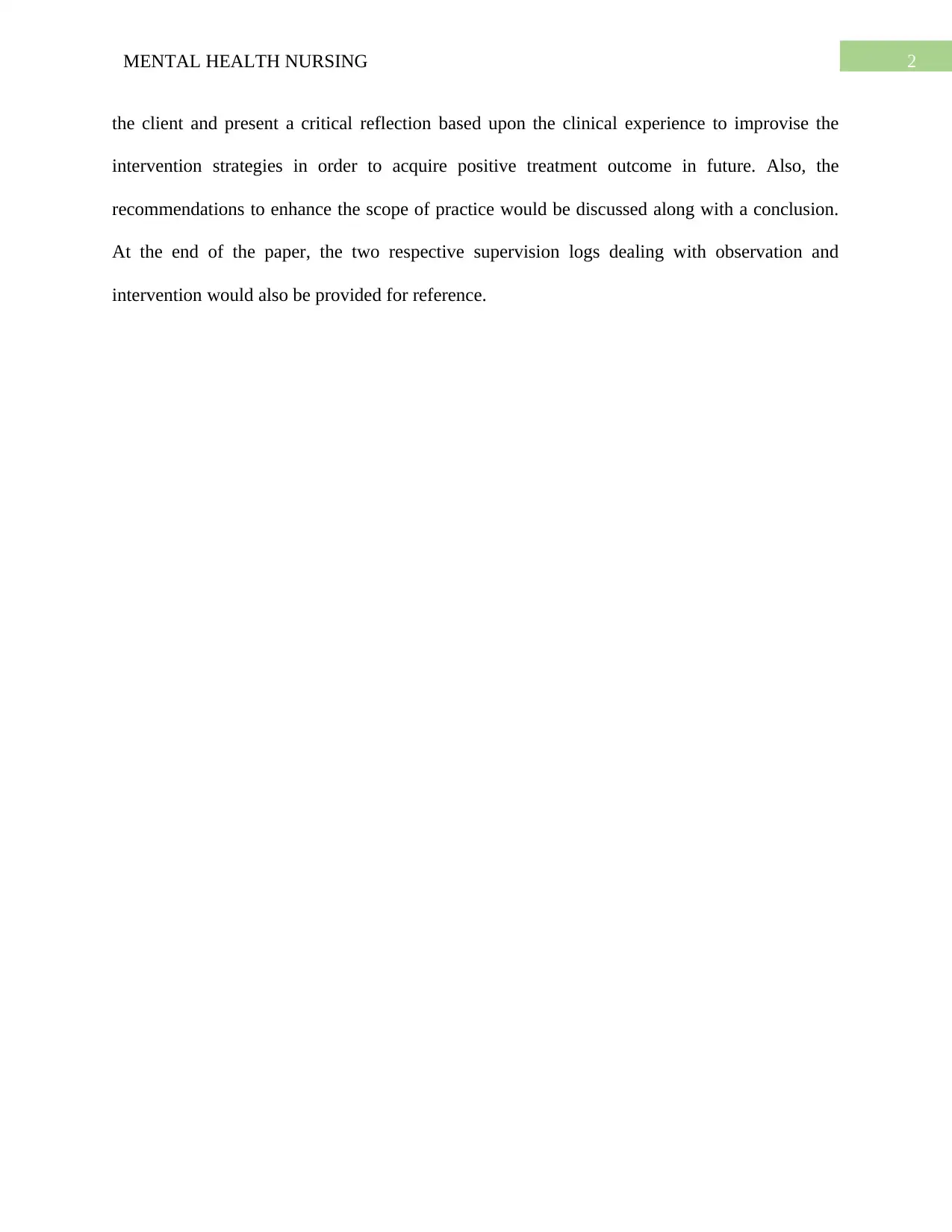
2MENTAL HEALTH NURSING
the client and present a critical reflection based upon the clinical experience to improvise the
intervention strategies in order to acquire positive treatment outcome in future. Also, the
recommendations to enhance the scope of practice would be discussed along with a conclusion.
At the end of the paper, the two respective supervision logs dealing with observation and
intervention would also be provided for reference.
the client and present a critical reflection based upon the clinical experience to improvise the
intervention strategies in order to acquire positive treatment outcome in future. Also, the
recommendations to enhance the scope of practice would be discussed along with a conclusion.
At the end of the paper, the two respective supervision logs dealing with observation and
intervention would also be provided for reference.
⊘ This is a preview!⊘
Do you want full access?
Subscribe today to unlock all pages.

Trusted by 1+ million students worldwide
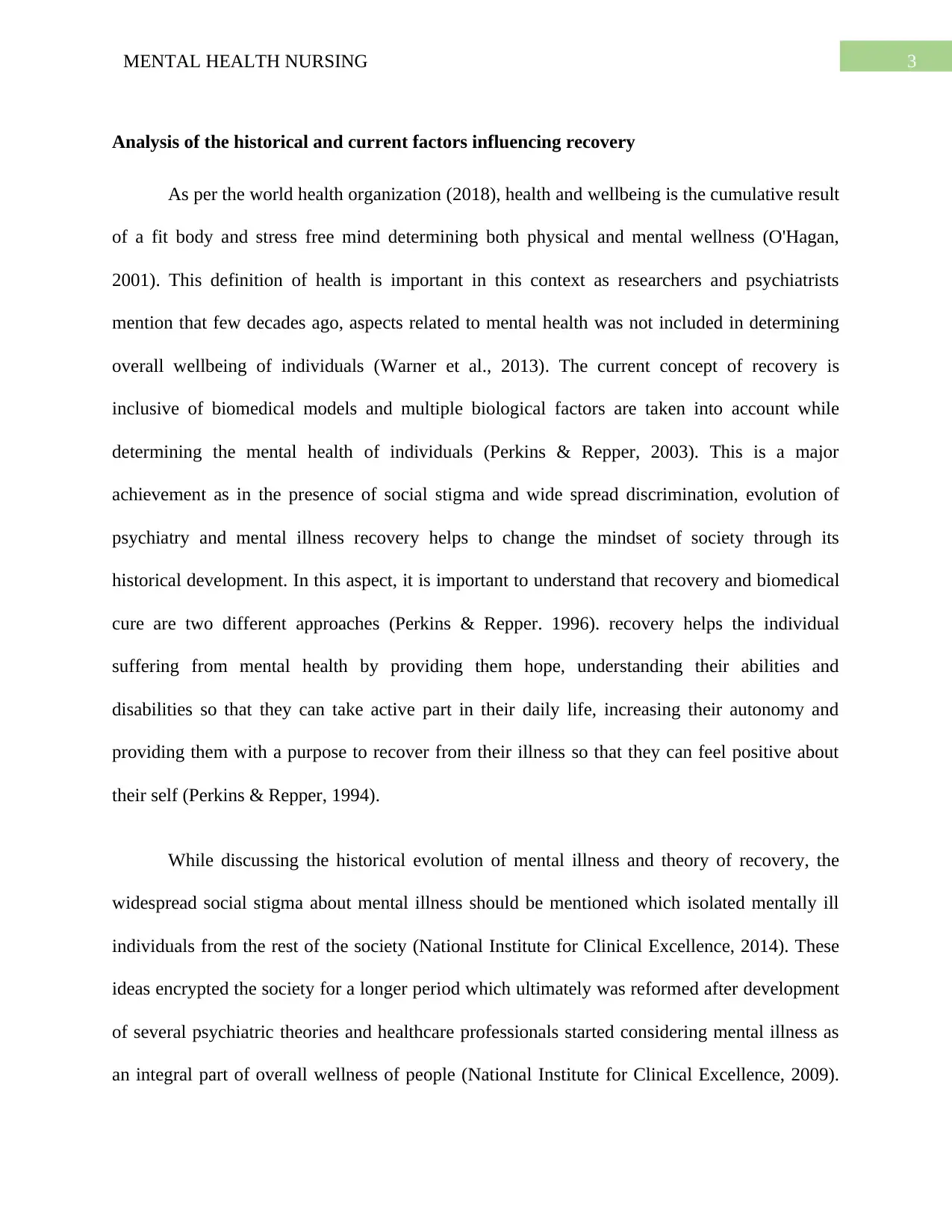
3MENTAL HEALTH NURSING
Analysis of the historical and current factors influencing recovery
As per the world health organization (2018), health and wellbeing is the cumulative result
of a fit body and stress free mind determining both physical and mental wellness (O'Hagan,
2001). This definition of health is important in this context as researchers and psychiatrists
mention that few decades ago, aspects related to mental health was not included in determining
overall wellbeing of individuals (Warner et al., 2013). The current concept of recovery is
inclusive of biomedical models and multiple biological factors are taken into account while
determining the mental health of individuals (Perkins & Repper, 2003). This is a major
achievement as in the presence of social stigma and wide spread discrimination, evolution of
psychiatry and mental illness recovery helps to change the mindset of society through its
historical development. In this aspect, it is important to understand that recovery and biomedical
cure are two different approaches (Perkins & Repper. 1996). recovery helps the individual
suffering from mental health by providing them hope, understanding their abilities and
disabilities so that they can take active part in their daily life, increasing their autonomy and
providing them with a purpose to recover from their illness so that they can feel positive about
their self (Perkins & Repper, 1994).
While discussing the historical evolution of mental illness and theory of recovery, the
widespread social stigma about mental illness should be mentioned which isolated mentally ill
individuals from the rest of the society (National Institute for Clinical Excellence, 2014). These
ideas encrypted the society for a longer period which ultimately was reformed after development
of several psychiatric theories and healthcare professionals started considering mental illness as
an integral part of overall wellness of people (National Institute for Clinical Excellence, 2009).
Analysis of the historical and current factors influencing recovery
As per the world health organization (2018), health and wellbeing is the cumulative result
of a fit body and stress free mind determining both physical and mental wellness (O'Hagan,
2001). This definition of health is important in this context as researchers and psychiatrists
mention that few decades ago, aspects related to mental health was not included in determining
overall wellbeing of individuals (Warner et al., 2013). The current concept of recovery is
inclusive of biomedical models and multiple biological factors are taken into account while
determining the mental health of individuals (Perkins & Repper, 2003). This is a major
achievement as in the presence of social stigma and wide spread discrimination, evolution of
psychiatry and mental illness recovery helps to change the mindset of society through its
historical development. In this aspect, it is important to understand that recovery and biomedical
cure are two different approaches (Perkins & Repper. 1996). recovery helps the individual
suffering from mental health by providing them hope, understanding their abilities and
disabilities so that they can take active part in their daily life, increasing their autonomy and
providing them with a purpose to recover from their illness so that they can feel positive about
their self (Perkins & Repper, 1994).
While discussing the historical evolution of mental illness and theory of recovery, the
widespread social stigma about mental illness should be mentioned which isolated mentally ill
individuals from the rest of the society (National Institute for Clinical Excellence, 2014). These
ideas encrypted the society for a longer period which ultimately was reformed after development
of several psychiatric theories and healthcare professionals started considering mental illness as
an integral part of overall wellness of people (National Institute for Clinical Excellence, 2009).
Paraphrase This Document
Need a fresh take? Get an instant paraphrase of this document with our AI Paraphraser
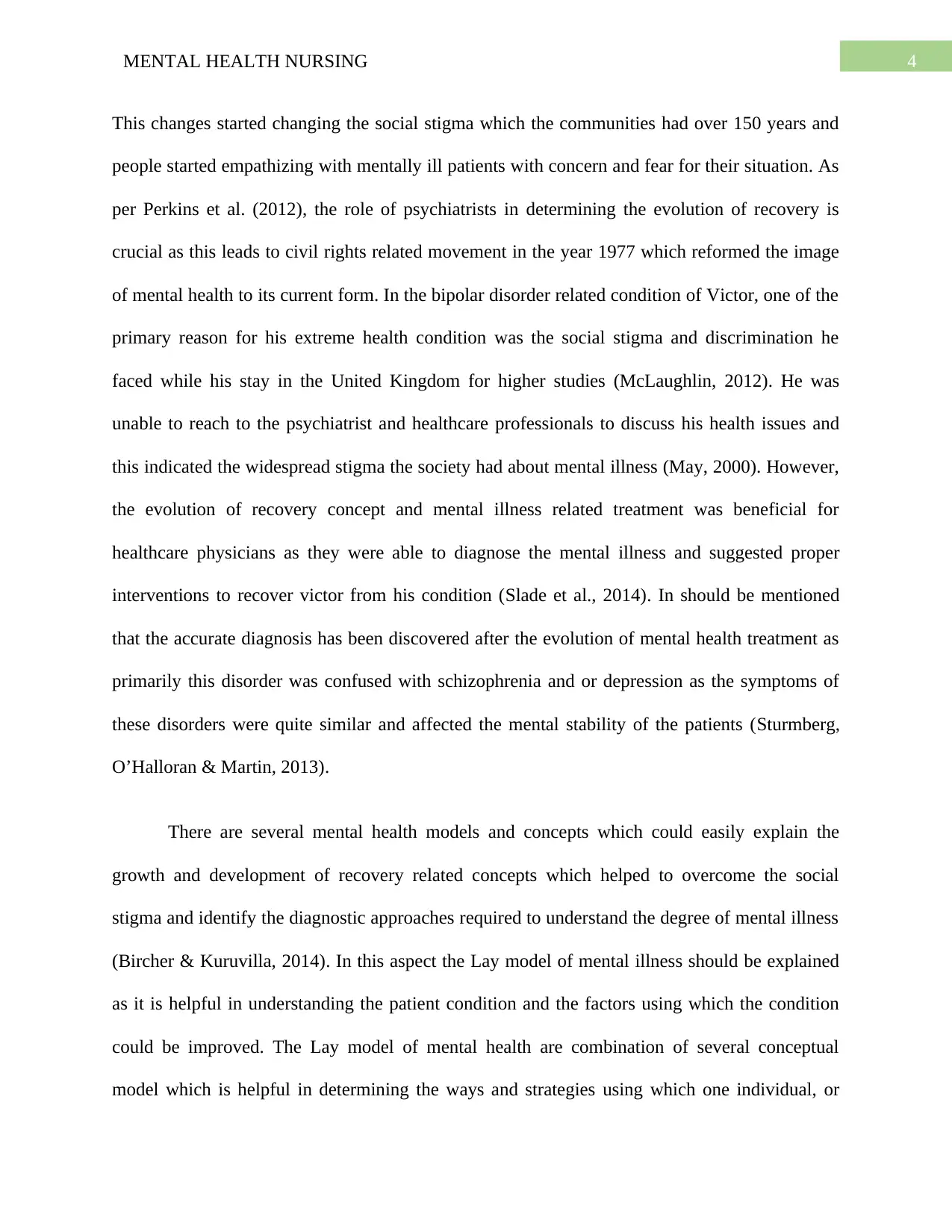
4MENTAL HEALTH NURSING
This changes started changing the social stigma which the communities had over 150 years and
people started empathizing with mentally ill patients with concern and fear for their situation. As
per Perkins et al. (2012), the role of psychiatrists in determining the evolution of recovery is
crucial as this leads to civil rights related movement in the year 1977 which reformed the image
of mental health to its current form. In the bipolar disorder related condition of Victor, one of the
primary reason for his extreme health condition was the social stigma and discrimination he
faced while his stay in the United Kingdom for higher studies (McLaughlin, 2012). He was
unable to reach to the psychiatrist and healthcare professionals to discuss his health issues and
this indicated the widespread stigma the society had about mental illness (May, 2000). However,
the evolution of recovery concept and mental illness related treatment was beneficial for
healthcare physicians as they were able to diagnose the mental illness and suggested proper
interventions to recover victor from his condition (Slade et al., 2014). In should be mentioned
that the accurate diagnosis has been discovered after the evolution of mental health treatment as
primarily this disorder was confused with schizophrenia and or depression as the symptoms of
these disorders were quite similar and affected the mental stability of the patients (Sturmberg,
O’Halloran & Martin, 2013).
There are several mental health models and concepts which could easily explain the
growth and development of recovery related concepts which helped to overcome the social
stigma and identify the diagnostic approaches required to understand the degree of mental illness
(Bircher & Kuruvilla, 2014). In this aspect the Lay model of mental illness should be explained
as it is helpful in understanding the patient condition and the factors using which the condition
could be improved. The Lay model of mental health are combination of several conceptual
model which is helpful in determining the ways and strategies using which one individual, or
This changes started changing the social stigma which the communities had over 150 years and
people started empathizing with mentally ill patients with concern and fear for their situation. As
per Perkins et al. (2012), the role of psychiatrists in determining the evolution of recovery is
crucial as this leads to civil rights related movement in the year 1977 which reformed the image
of mental health to its current form. In the bipolar disorder related condition of Victor, one of the
primary reason for his extreme health condition was the social stigma and discrimination he
faced while his stay in the United Kingdom for higher studies (McLaughlin, 2012). He was
unable to reach to the psychiatrist and healthcare professionals to discuss his health issues and
this indicated the widespread stigma the society had about mental illness (May, 2000). However,
the evolution of recovery concept and mental illness related treatment was beneficial for
healthcare physicians as they were able to diagnose the mental illness and suggested proper
interventions to recover victor from his condition (Slade et al., 2014). In should be mentioned
that the accurate diagnosis has been discovered after the evolution of mental health treatment as
primarily this disorder was confused with schizophrenia and or depression as the symptoms of
these disorders were quite similar and affected the mental stability of the patients (Sturmberg,
O’Halloran & Martin, 2013).
There are several mental health models and concepts which could easily explain the
growth and development of recovery related concepts which helped to overcome the social
stigma and identify the diagnostic approaches required to understand the degree of mental illness
(Bircher & Kuruvilla, 2014). In this aspect the Lay model of mental illness should be explained
as it is helpful in understanding the patient condition and the factors using which the condition
could be improved. The Lay model of mental health are combination of several conceptual
model which is helpful in determining the ways and strategies using which one individual, or
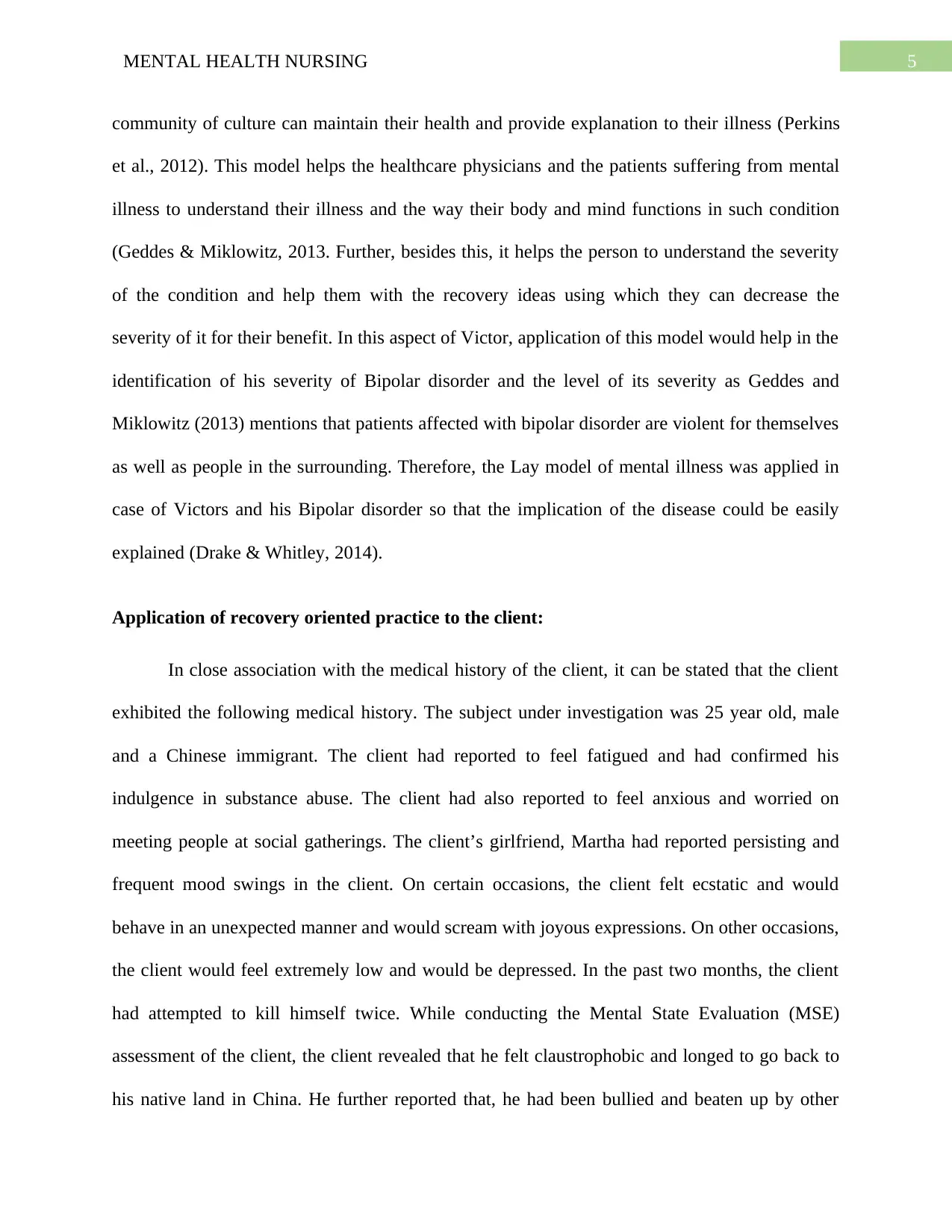
5MENTAL HEALTH NURSING
community of culture can maintain their health and provide explanation to their illness (Perkins
et al., 2012). This model helps the healthcare physicians and the patients suffering from mental
illness to understand their illness and the way their body and mind functions in such condition
(Geddes & Miklowitz, 2013. Further, besides this, it helps the person to understand the severity
of the condition and help them with the recovery ideas using which they can decrease the
severity of it for their benefit. In this aspect of Victor, application of this model would help in the
identification of his severity of Bipolar disorder and the level of its severity as Geddes and
Miklowitz (2013) mentions that patients affected with bipolar disorder are violent for themselves
as well as people in the surrounding. Therefore, the Lay model of mental illness was applied in
case of Victors and his Bipolar disorder so that the implication of the disease could be easily
explained (Drake & Whitley, 2014).
Application of recovery oriented practice to the client:
In close association with the medical history of the client, it can be stated that the client
exhibited the following medical history. The subject under investigation was 25 year old, male
and a Chinese immigrant. The client had reported to feel fatigued and had confirmed his
indulgence in substance abuse. The client had also reported to feel anxious and worried on
meeting people at social gatherings. The client’s girlfriend, Martha had reported persisting and
frequent mood swings in the client. On certain occasions, the client felt ecstatic and would
behave in an unexpected manner and would scream with joyous expressions. On other occasions,
the client would feel extremely low and would be depressed. In the past two months, the client
had attempted to kill himself twice. While conducting the Mental State Evaluation (MSE)
assessment of the client, the client revealed that he felt claustrophobic and longed to go back to
his native land in China. He further reported that, he had been bullied and beaten up by other
community of culture can maintain their health and provide explanation to their illness (Perkins
et al., 2012). This model helps the healthcare physicians and the patients suffering from mental
illness to understand their illness and the way their body and mind functions in such condition
(Geddes & Miklowitz, 2013. Further, besides this, it helps the person to understand the severity
of the condition and help them with the recovery ideas using which they can decrease the
severity of it for their benefit. In this aspect of Victor, application of this model would help in the
identification of his severity of Bipolar disorder and the level of its severity as Geddes and
Miklowitz (2013) mentions that patients affected with bipolar disorder are violent for themselves
as well as people in the surrounding. Therefore, the Lay model of mental illness was applied in
case of Victors and his Bipolar disorder so that the implication of the disease could be easily
explained (Drake & Whitley, 2014).
Application of recovery oriented practice to the client:
In close association with the medical history of the client, it can be stated that the client
exhibited the following medical history. The subject under investigation was 25 year old, male
and a Chinese immigrant. The client had reported to feel fatigued and had confirmed his
indulgence in substance abuse. The client had also reported to feel anxious and worried on
meeting people at social gatherings. The client’s girlfriend, Martha had reported persisting and
frequent mood swings in the client. On certain occasions, the client felt ecstatic and would
behave in an unexpected manner and would scream with joyous expressions. On other occasions,
the client would feel extremely low and would be depressed. In the past two months, the client
had attempted to kill himself twice. While conducting the Mental State Evaluation (MSE)
assessment of the client, the client revealed that he felt claustrophobic and longed to go back to
his native land in China. He further reported that, he had been bullied and beaten up by other
⊘ This is a preview!⊘
Do you want full access?
Subscribe today to unlock all pages.

Trusted by 1+ million students worldwide
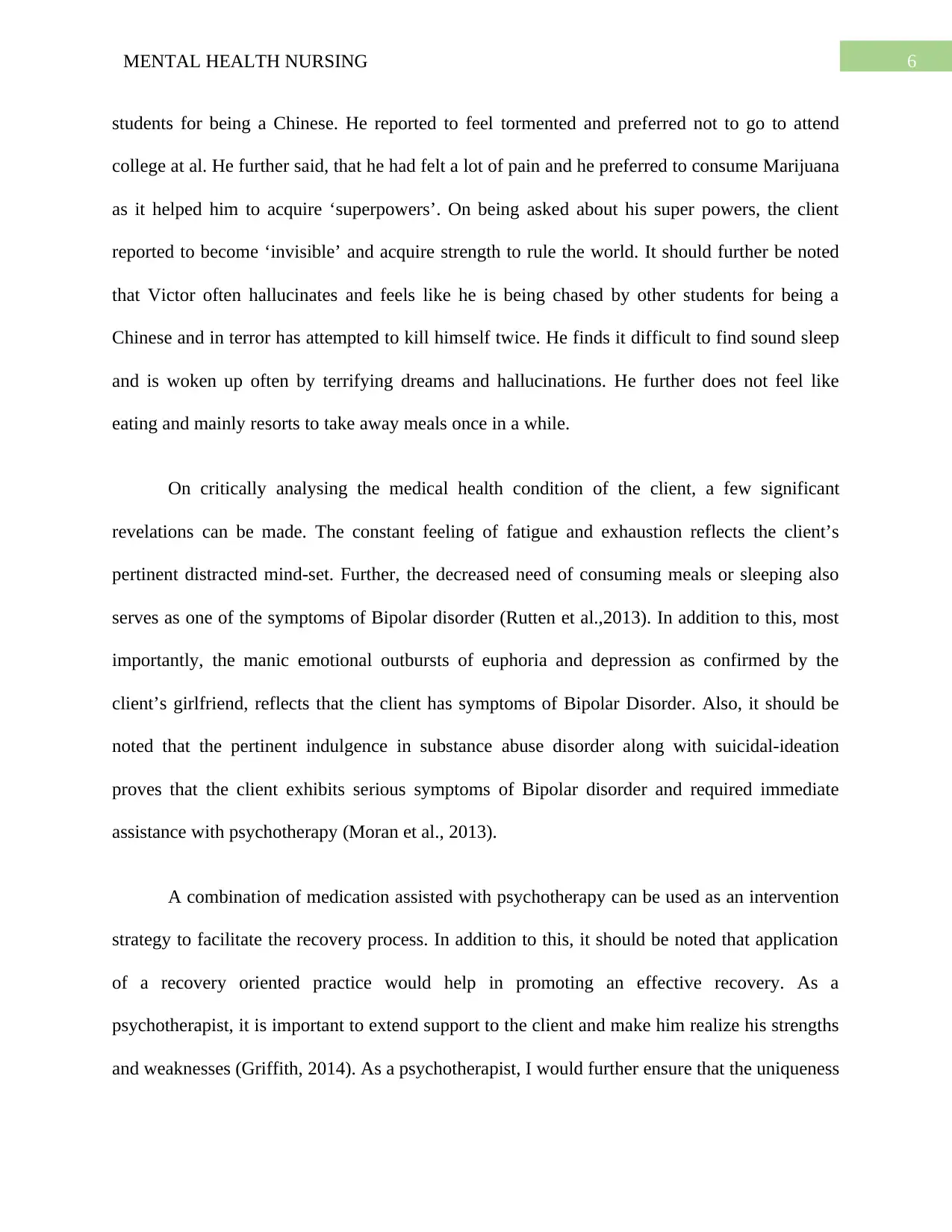
6MENTAL HEALTH NURSING
students for being a Chinese. He reported to feel tormented and preferred not to go to attend
college at al. He further said, that he had felt a lot of pain and he preferred to consume Marijuana
as it helped him to acquire ‘superpowers’. On being asked about his super powers, the client
reported to become ‘invisible’ and acquire strength to rule the world. It should further be noted
that Victor often hallucinates and feels like he is being chased by other students for being a
Chinese and in terror has attempted to kill himself twice. He finds it difficult to find sound sleep
and is woken up often by terrifying dreams and hallucinations. He further does not feel like
eating and mainly resorts to take away meals once in a while.
On critically analysing the medical health condition of the client, a few significant
revelations can be made. The constant feeling of fatigue and exhaustion reflects the client’s
pertinent distracted mind-set. Further, the decreased need of consuming meals or sleeping also
serves as one of the symptoms of Bipolar disorder (Rutten et al.,2013). In addition to this, most
importantly, the manic emotional outbursts of euphoria and depression as confirmed by the
client’s girlfriend, reflects that the client has symptoms of Bipolar Disorder. Also, it should be
noted that the pertinent indulgence in substance abuse disorder along with suicidal-ideation
proves that the client exhibits serious symptoms of Bipolar disorder and required immediate
assistance with psychotherapy (Moran et al., 2013).
A combination of medication assisted with psychotherapy can be used as an intervention
strategy to facilitate the recovery process. In addition to this, it should be noted that application
of a recovery oriented practice would help in promoting an effective recovery. As a
psychotherapist, it is important to extend support to the client and make him realize his strengths
and weaknesses (Griffith, 2014). As a psychotherapist, I would further ensure that the uniqueness
students for being a Chinese. He reported to feel tormented and preferred not to go to attend
college at al. He further said, that he had felt a lot of pain and he preferred to consume Marijuana
as it helped him to acquire ‘superpowers’. On being asked about his super powers, the client
reported to become ‘invisible’ and acquire strength to rule the world. It should further be noted
that Victor often hallucinates and feels like he is being chased by other students for being a
Chinese and in terror has attempted to kill himself twice. He finds it difficult to find sound sleep
and is woken up often by terrifying dreams and hallucinations. He further does not feel like
eating and mainly resorts to take away meals once in a while.
On critically analysing the medical health condition of the client, a few significant
revelations can be made. The constant feeling of fatigue and exhaustion reflects the client’s
pertinent distracted mind-set. Further, the decreased need of consuming meals or sleeping also
serves as one of the symptoms of Bipolar disorder (Rutten et al.,2013). In addition to this, most
importantly, the manic emotional outbursts of euphoria and depression as confirmed by the
client’s girlfriend, reflects that the client has symptoms of Bipolar Disorder. Also, it should be
noted that the pertinent indulgence in substance abuse disorder along with suicidal-ideation
proves that the client exhibits serious symptoms of Bipolar disorder and required immediate
assistance with psychotherapy (Moran et al., 2013).
A combination of medication assisted with psychotherapy can be used as an intervention
strategy to facilitate the recovery process. In addition to this, it should be noted that application
of a recovery oriented practice would help in promoting an effective recovery. As a
psychotherapist, it is important to extend support to the client and make him realize his strengths
and weaknesses (Griffith, 2014). As a psychotherapist, I would further ensure that the uniqueness
Paraphrase This Document
Need a fresh take? Get an instant paraphrase of this document with our AI Paraphraser
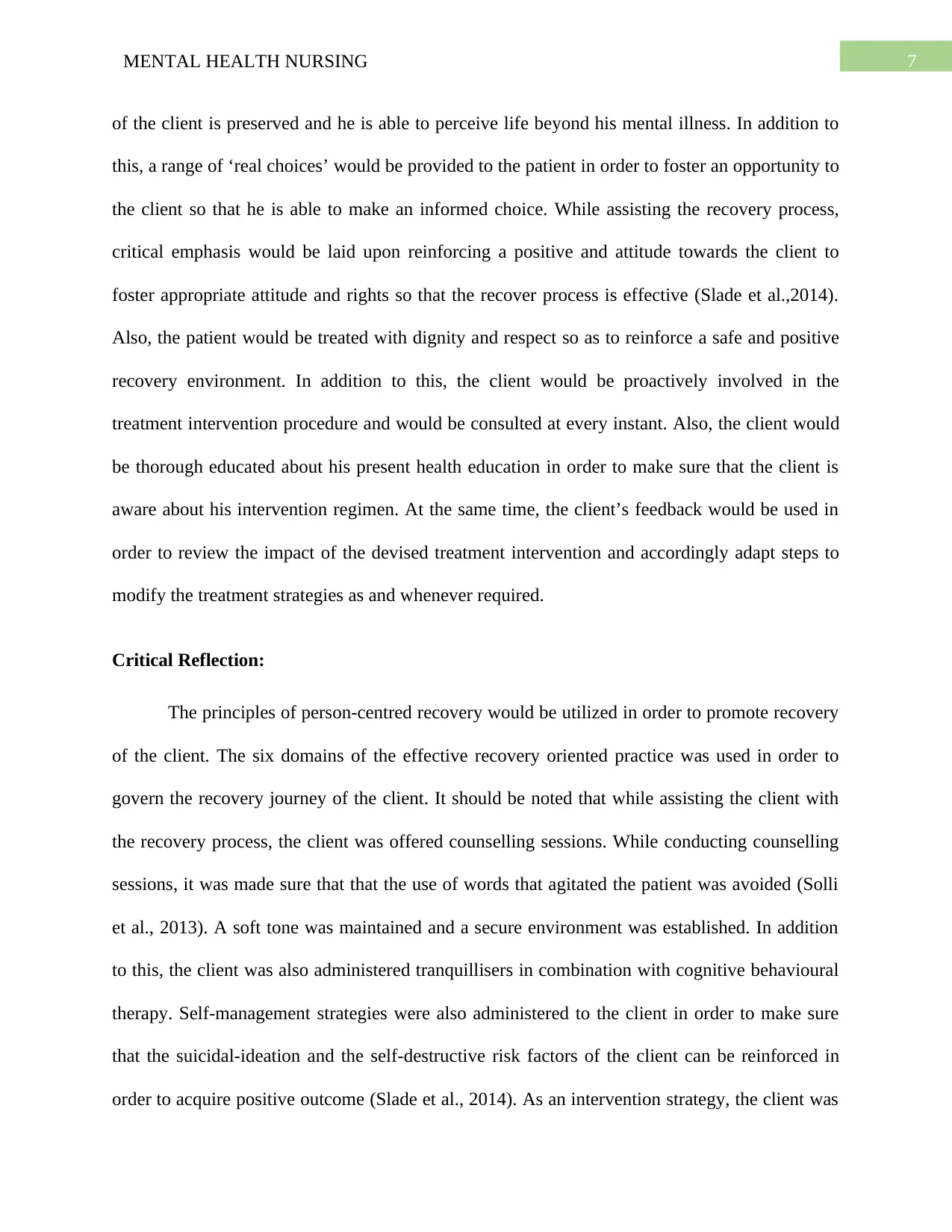
7MENTAL HEALTH NURSING
of the client is preserved and he is able to perceive life beyond his mental illness. In addition to
this, a range of ‘real choices’ would be provided to the patient in order to foster an opportunity to
the client so that he is able to make an informed choice. While assisting the recovery process,
critical emphasis would be laid upon reinforcing a positive and attitude towards the client to
foster appropriate attitude and rights so that the recover process is effective (Slade et al.,2014).
Also, the patient would be treated with dignity and respect so as to reinforce a safe and positive
recovery environment. In addition to this, the client would be proactively involved in the
treatment intervention procedure and would be consulted at every instant. Also, the client would
be thorough educated about his present health education in order to make sure that the client is
aware about his intervention regimen. At the same time, the client’s feedback would be used in
order to review the impact of the devised treatment intervention and accordingly adapt steps to
modify the treatment strategies as and whenever required.
Critical Reflection:
The principles of person-centred recovery would be utilized in order to promote recovery
of the client. The six domains of the effective recovery oriented practice was used in order to
govern the recovery journey of the client. It should be noted that while assisting the client with
the recovery process, the client was offered counselling sessions. While conducting counselling
sessions, it was made sure that that the use of words that agitated the patient was avoided (Solli
et al., 2013). A soft tone was maintained and a secure environment was established. In addition
to this, the client was also administered tranquillisers in combination with cognitive behavioural
therapy. Self-management strategies were also administered to the client in order to make sure
that the suicidal-ideation and the self-destructive risk factors of the client can be reinforced in
order to acquire positive outcome (Slade et al., 2014). As an intervention strategy, the client was
of the client is preserved and he is able to perceive life beyond his mental illness. In addition to
this, a range of ‘real choices’ would be provided to the patient in order to foster an opportunity to
the client so that he is able to make an informed choice. While assisting the recovery process,
critical emphasis would be laid upon reinforcing a positive and attitude towards the client to
foster appropriate attitude and rights so that the recover process is effective (Slade et al.,2014).
Also, the patient would be treated with dignity and respect so as to reinforce a safe and positive
recovery environment. In addition to this, the client would be proactively involved in the
treatment intervention procedure and would be consulted at every instant. Also, the client would
be thorough educated about his present health education in order to make sure that the client is
aware about his intervention regimen. At the same time, the client’s feedback would be used in
order to review the impact of the devised treatment intervention and accordingly adapt steps to
modify the treatment strategies as and whenever required.
Critical Reflection:
The principles of person-centred recovery would be utilized in order to promote recovery
of the client. The six domains of the effective recovery oriented practice was used in order to
govern the recovery journey of the client. It should be noted that while assisting the client with
the recovery process, the client was offered counselling sessions. While conducting counselling
sessions, it was made sure that that the use of words that agitated the patient was avoided (Solli
et al., 2013). A soft tone was maintained and a secure environment was established. In addition
to this, the client was also administered tranquillisers in combination with cognitive behavioural
therapy. Self-management strategies were also administered to the client in order to make sure
that the suicidal-ideation and the self-destructive risk factors of the client can be reinforced in
order to acquire positive outcome (Slade et al., 2014). As an intervention strategy, the client was
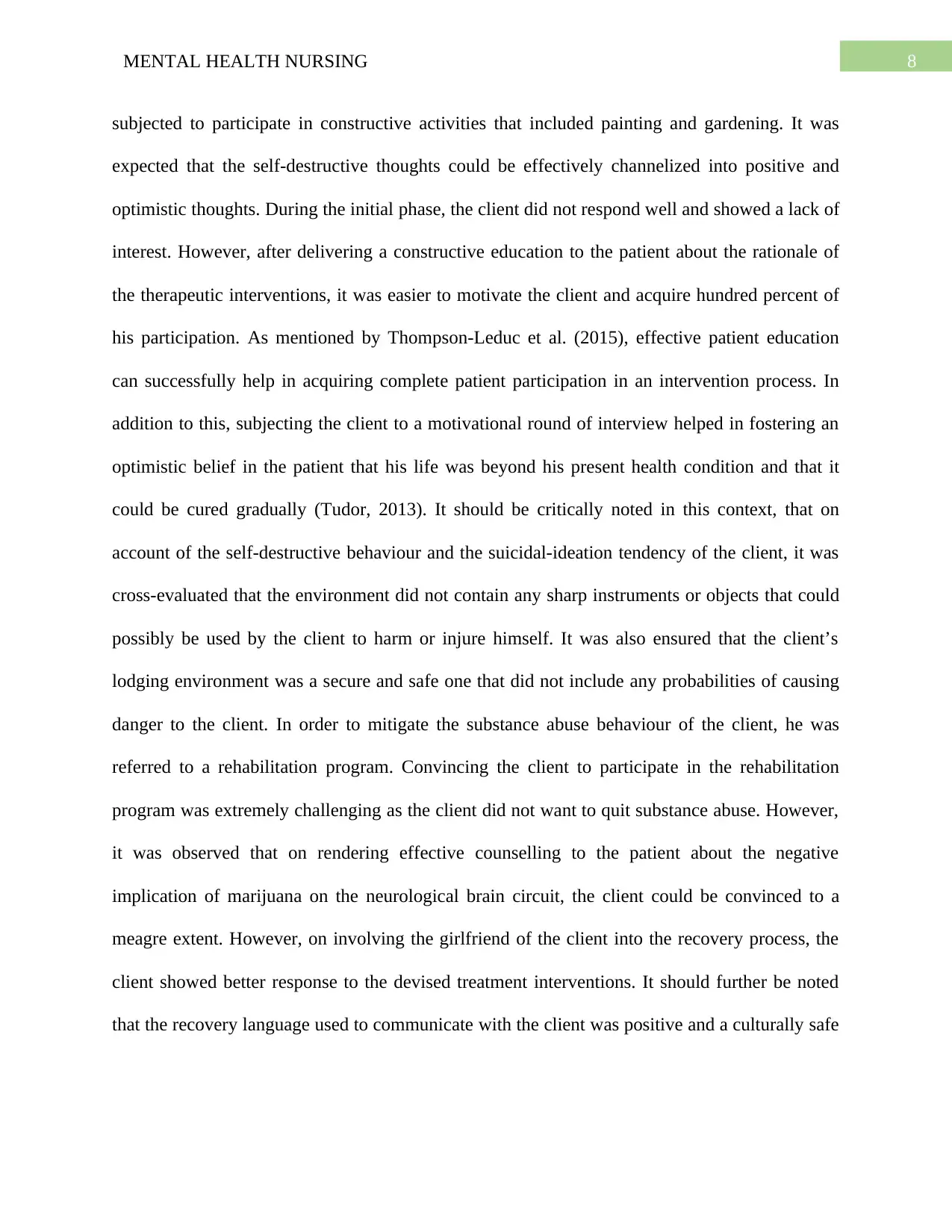
8MENTAL HEALTH NURSING
subjected to participate in constructive activities that included painting and gardening. It was
expected that the self-destructive thoughts could be effectively channelized into positive and
optimistic thoughts. During the initial phase, the client did not respond well and showed a lack of
interest. However, after delivering a constructive education to the patient about the rationale of
the therapeutic interventions, it was easier to motivate the client and acquire hundred percent of
his participation. As mentioned by Thompson-Leduc et al. (2015), effective patient education
can successfully help in acquiring complete patient participation in an intervention process. In
addition to this, subjecting the client to a motivational round of interview helped in fostering an
optimistic belief in the patient that his life was beyond his present health condition and that it
could be cured gradually (Tudor, 2013). It should be critically noted in this context, that on
account of the self-destructive behaviour and the suicidal-ideation tendency of the client, it was
cross-evaluated that the environment did not contain any sharp instruments or objects that could
possibly be used by the client to harm or injure himself. It was also ensured that the client’s
lodging environment was a secure and safe one that did not include any probabilities of causing
danger to the client. In order to mitigate the substance abuse behaviour of the client, he was
referred to a rehabilitation program. Convincing the client to participate in the rehabilitation
program was extremely challenging as the client did not want to quit substance abuse. However,
it was observed that on rendering effective counselling to the patient about the negative
implication of marijuana on the neurological brain circuit, the client could be convinced to a
meagre extent. However, on involving the girlfriend of the client into the recovery process, the
client showed better response to the devised treatment interventions. It should further be noted
that the recovery language used to communicate with the client was positive and a culturally safe
subjected to participate in constructive activities that included painting and gardening. It was
expected that the self-destructive thoughts could be effectively channelized into positive and
optimistic thoughts. During the initial phase, the client did not respond well and showed a lack of
interest. However, after delivering a constructive education to the patient about the rationale of
the therapeutic interventions, it was easier to motivate the client and acquire hundred percent of
his participation. As mentioned by Thompson-Leduc et al. (2015), effective patient education
can successfully help in acquiring complete patient participation in an intervention process. In
addition to this, subjecting the client to a motivational round of interview helped in fostering an
optimistic belief in the patient that his life was beyond his present health condition and that it
could be cured gradually (Tudor, 2013). It should be critically noted in this context, that on
account of the self-destructive behaviour and the suicidal-ideation tendency of the client, it was
cross-evaluated that the environment did not contain any sharp instruments or objects that could
possibly be used by the client to harm or injure himself. It was also ensured that the client’s
lodging environment was a secure and safe one that did not include any probabilities of causing
danger to the client. In order to mitigate the substance abuse behaviour of the client, he was
referred to a rehabilitation program. Convincing the client to participate in the rehabilitation
program was extremely challenging as the client did not want to quit substance abuse. However,
it was observed that on rendering effective counselling to the patient about the negative
implication of marijuana on the neurological brain circuit, the client could be convinced to a
meagre extent. However, on involving the girlfriend of the client into the recovery process, the
client showed better response to the devised treatment interventions. It should further be noted
that the recovery language used to communicate with the client was positive and a culturally safe
⊘ This is a preview!⊘
Do you want full access?
Subscribe today to unlock all pages.

Trusted by 1+ million students worldwide
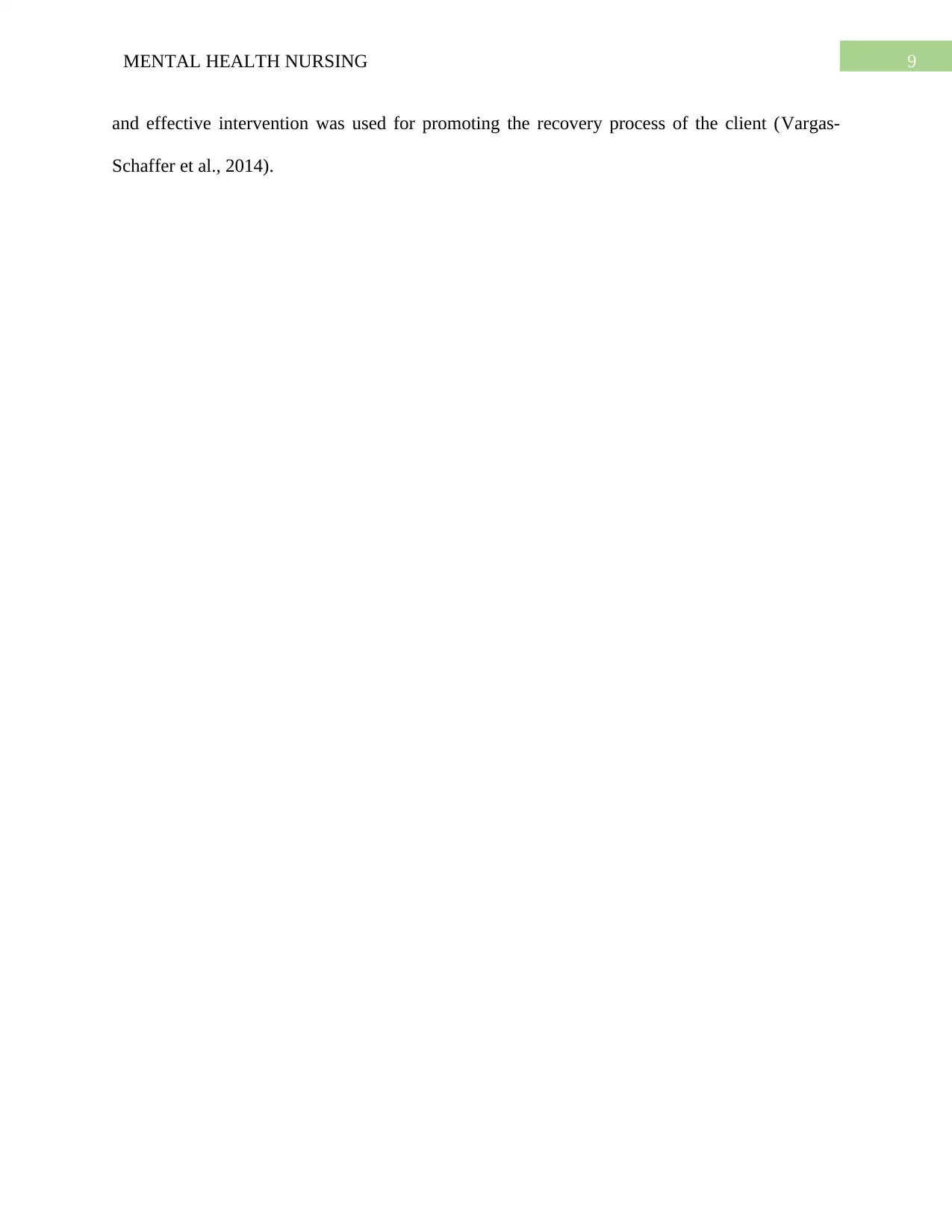
9MENTAL HEALTH NURSING
and effective intervention was used for promoting the recovery process of the client (Vargas-
Schaffer et al., 2014).
and effective intervention was used for promoting the recovery process of the client (Vargas-
Schaffer et al., 2014).
Paraphrase This Document
Need a fresh take? Get an instant paraphrase of this document with our AI Paraphraser
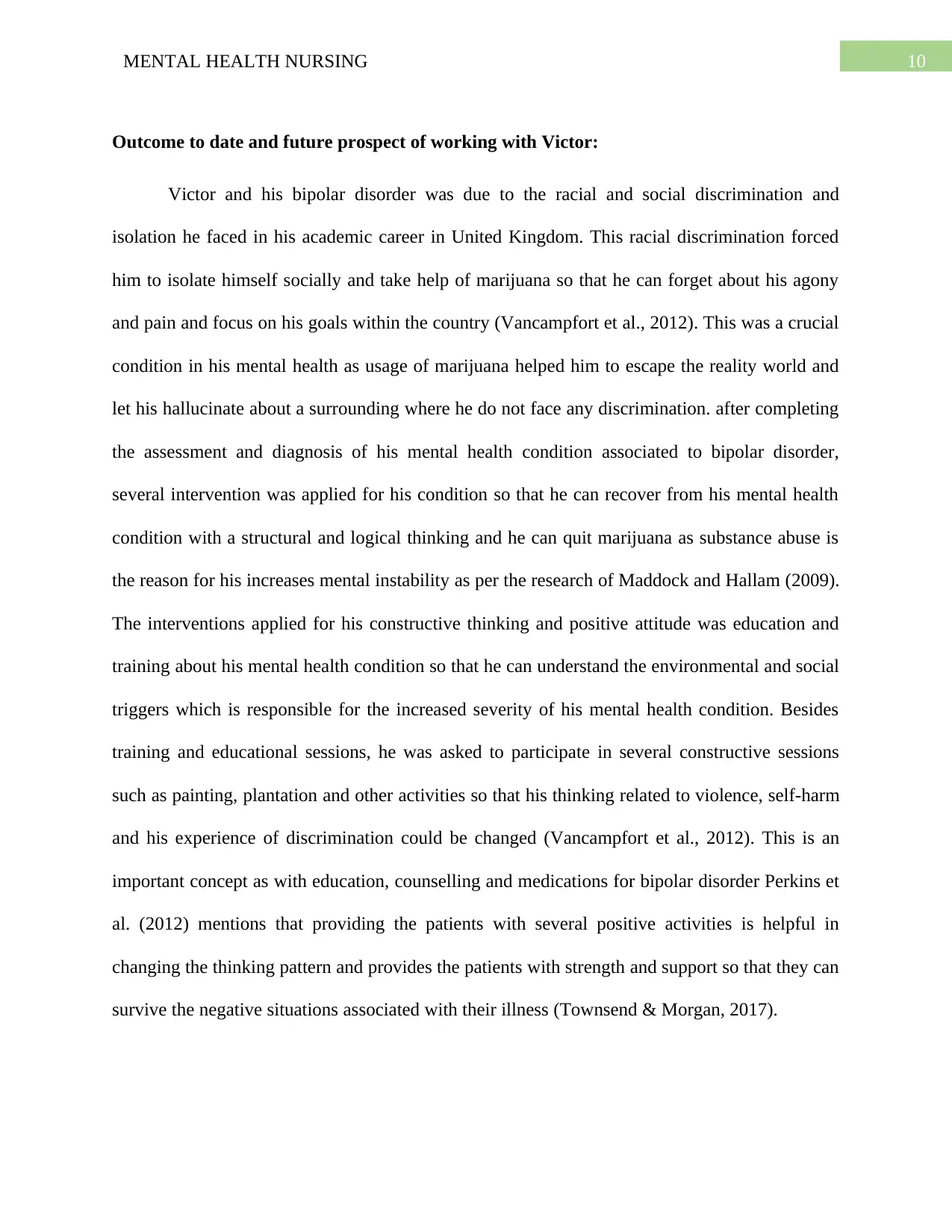
10MENTAL HEALTH NURSING
Outcome to date and future prospect of working with Victor:
Victor and his bipolar disorder was due to the racial and social discrimination and
isolation he faced in his academic career in United Kingdom. This racial discrimination forced
him to isolate himself socially and take help of marijuana so that he can forget about his agony
and pain and focus on his goals within the country (Vancampfort et al., 2012). This was a crucial
condition in his mental health as usage of marijuana helped him to escape the reality world and
let his hallucinate about a surrounding where he do not face any discrimination. after completing
the assessment and diagnosis of his mental health condition associated to bipolar disorder,
several intervention was applied for his condition so that he can recover from his mental health
condition with a structural and logical thinking and he can quit marijuana as substance abuse is
the reason for his increases mental instability as per the research of Maddock and Hallam (2009).
The interventions applied for his constructive thinking and positive attitude was education and
training about his mental health condition so that he can understand the environmental and social
triggers which is responsible for the increased severity of his mental health condition. Besides
training and educational sessions, he was asked to participate in several constructive sessions
such as painting, plantation and other activities so that his thinking related to violence, self-harm
and his experience of discrimination could be changed (Vancampfort et al., 2012). This is an
important concept as with education, counselling and medications for bipolar disorder Perkins et
al. (2012) mentions that providing the patients with several positive activities is helpful in
changing the thinking pattern and provides the patients with strength and support so that they can
survive the negative situations associated with their illness (Townsend & Morgan, 2017).
Outcome to date and future prospect of working with Victor:
Victor and his bipolar disorder was due to the racial and social discrimination and
isolation he faced in his academic career in United Kingdom. This racial discrimination forced
him to isolate himself socially and take help of marijuana so that he can forget about his agony
and pain and focus on his goals within the country (Vancampfort et al., 2012). This was a crucial
condition in his mental health as usage of marijuana helped him to escape the reality world and
let his hallucinate about a surrounding where he do not face any discrimination. after completing
the assessment and diagnosis of his mental health condition associated to bipolar disorder,
several intervention was applied for his condition so that he can recover from his mental health
condition with a structural and logical thinking and he can quit marijuana as substance abuse is
the reason for his increases mental instability as per the research of Maddock and Hallam (2009).
The interventions applied for his constructive thinking and positive attitude was education and
training about his mental health condition so that he can understand the environmental and social
triggers which is responsible for the increased severity of his mental health condition. Besides
training and educational sessions, he was asked to participate in several constructive sessions
such as painting, plantation and other activities so that his thinking related to violence, self-harm
and his experience of discrimination could be changed (Vancampfort et al., 2012). This is an
important concept as with education, counselling and medications for bipolar disorder Perkins et
al. (2012) mentions that providing the patients with several positive activities is helpful in
changing the thinking pattern and provides the patients with strength and support so that they can
survive the negative situations associated with their illness (Townsend & Morgan, 2017).
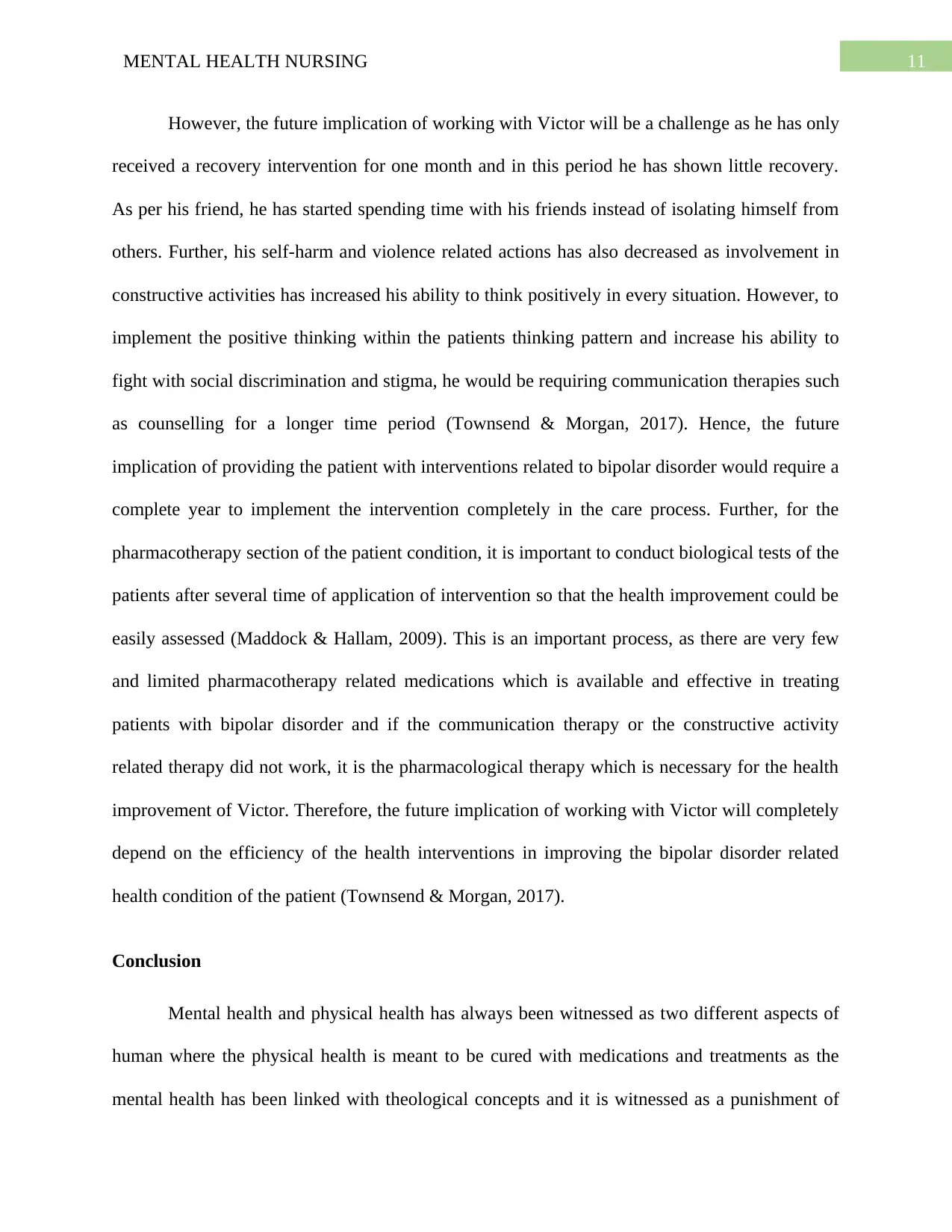
11MENTAL HEALTH NURSING
However, the future implication of working with Victor will be a challenge as he has only
received a recovery intervention for one month and in this period he has shown little recovery.
As per his friend, he has started spending time with his friends instead of isolating himself from
others. Further, his self-harm and violence related actions has also decreased as involvement in
constructive activities has increased his ability to think positively in every situation. However, to
implement the positive thinking within the patients thinking pattern and increase his ability to
fight with social discrimination and stigma, he would be requiring communication therapies such
as counselling for a longer time period (Townsend & Morgan, 2017). Hence, the future
implication of providing the patient with interventions related to bipolar disorder would require a
complete year to implement the intervention completely in the care process. Further, for the
pharmacotherapy section of the patient condition, it is important to conduct biological tests of the
patients after several time of application of intervention so that the health improvement could be
easily assessed (Maddock & Hallam, 2009). This is an important process, as there are very few
and limited pharmacotherapy related medications which is available and effective in treating
patients with bipolar disorder and if the communication therapy or the constructive activity
related therapy did not work, it is the pharmacological therapy which is necessary for the health
improvement of Victor. Therefore, the future implication of working with Victor will completely
depend on the efficiency of the health interventions in improving the bipolar disorder related
health condition of the patient (Townsend & Morgan, 2017).
Conclusion
Mental health and physical health has always been witnessed as two different aspects of
human where the physical health is meant to be cured with medications and treatments as the
mental health has been linked with theological concepts and it is witnessed as a punishment of
However, the future implication of working with Victor will be a challenge as he has only
received a recovery intervention for one month and in this period he has shown little recovery.
As per his friend, he has started spending time with his friends instead of isolating himself from
others. Further, his self-harm and violence related actions has also decreased as involvement in
constructive activities has increased his ability to think positively in every situation. However, to
implement the positive thinking within the patients thinking pattern and increase his ability to
fight with social discrimination and stigma, he would be requiring communication therapies such
as counselling for a longer time period (Townsend & Morgan, 2017). Hence, the future
implication of providing the patient with interventions related to bipolar disorder would require a
complete year to implement the intervention completely in the care process. Further, for the
pharmacotherapy section of the patient condition, it is important to conduct biological tests of the
patients after several time of application of intervention so that the health improvement could be
easily assessed (Maddock & Hallam, 2009). This is an important process, as there are very few
and limited pharmacotherapy related medications which is available and effective in treating
patients with bipolar disorder and if the communication therapy or the constructive activity
related therapy did not work, it is the pharmacological therapy which is necessary for the health
improvement of Victor. Therefore, the future implication of working with Victor will completely
depend on the efficiency of the health interventions in improving the bipolar disorder related
health condition of the patient (Townsend & Morgan, 2017).
Conclusion
Mental health and physical health has always been witnessed as two different aspects of
human where the physical health is meant to be cured with medications and treatments as the
mental health has been linked with theological concepts and it is witnessed as a punishment of
⊘ This is a preview!⊘
Do you want full access?
Subscribe today to unlock all pages.

Trusted by 1+ million students worldwide
1 out of 18
Related Documents
Your All-in-One AI-Powered Toolkit for Academic Success.
+13062052269
info@desklib.com
Available 24*7 on WhatsApp / Email
![[object Object]](/_next/static/media/star-bottom.7253800d.svg)
Unlock your academic potential
Copyright © 2020–2026 A2Z Services. All Rights Reserved. Developed and managed by ZUCOL.





